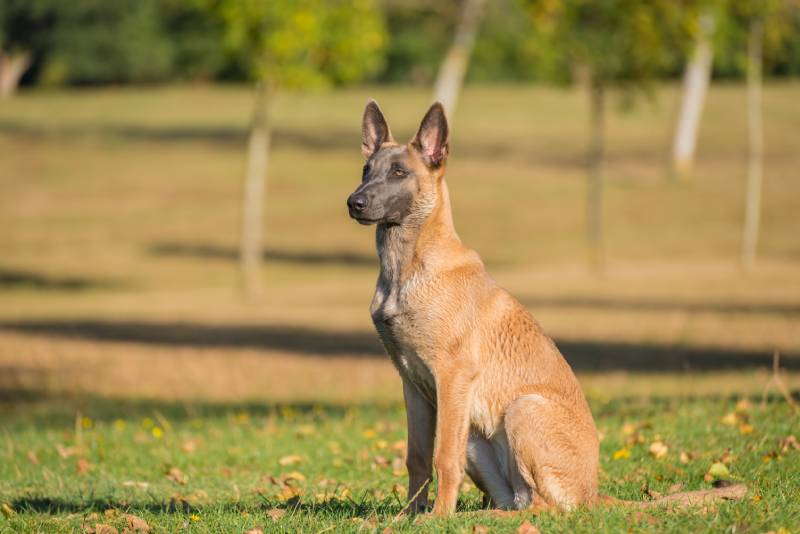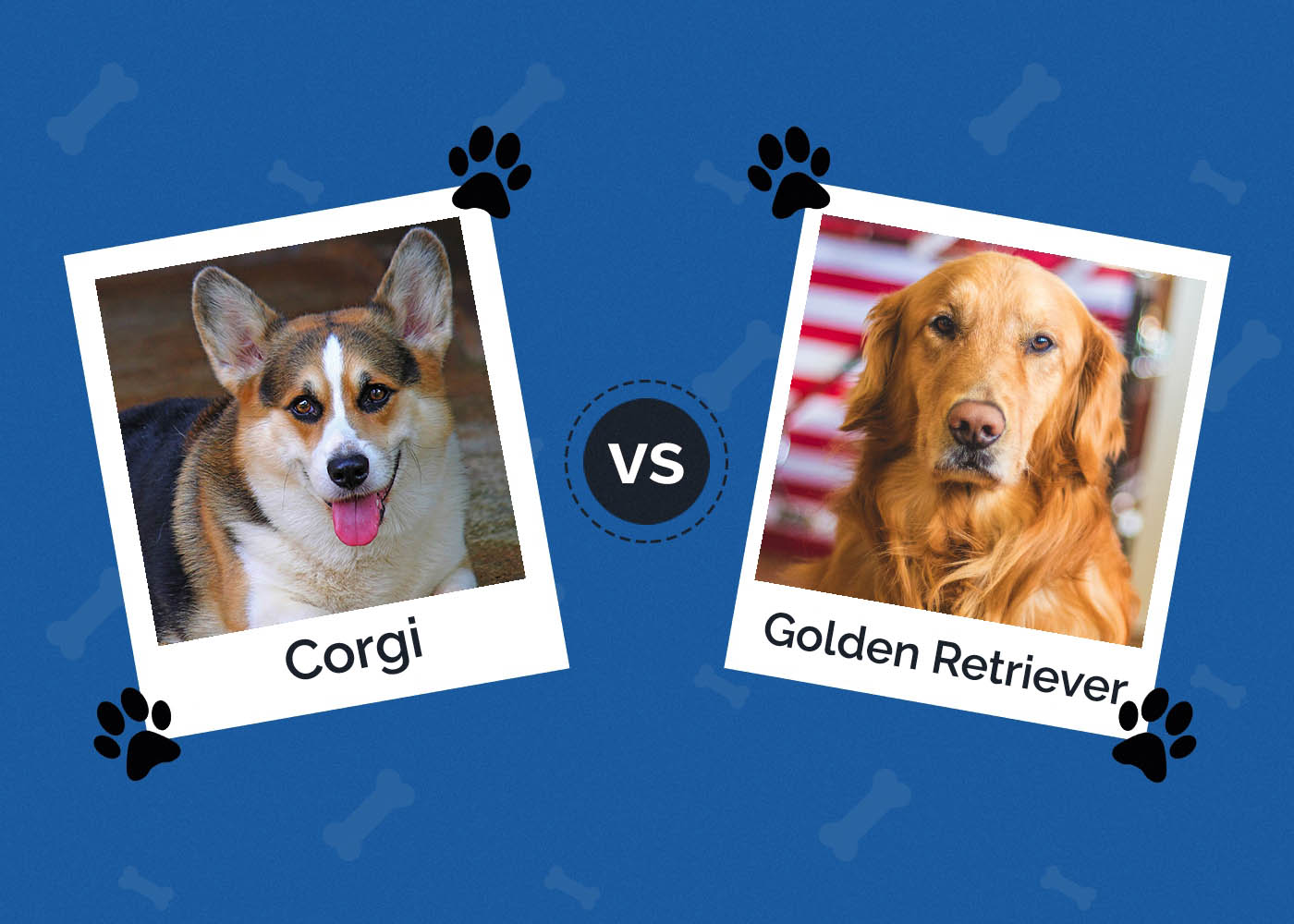Do Dobermans Drool a Lot? What You Need to Know!
By Lorre Luther
Updated on
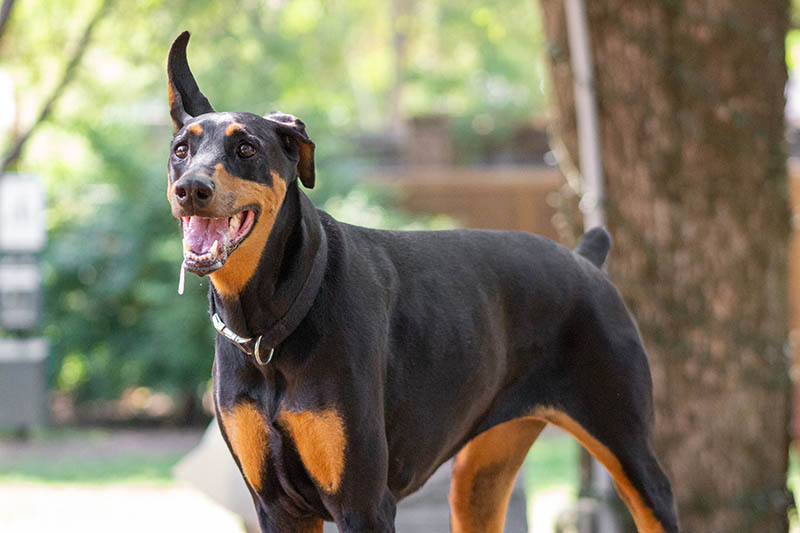
Doberman Pinschers are powerful, intelligent, fearless dogs that often work with law enforcement and as guards. They’re affectionate and active and make wonderful family pets happy to protect their loved ones. Dobermans are medium-sized working dogs that can reach up to 28 inches tall and weigh up to 100 pounds. Fortunately, they’re not heavy droolers.
Dobermans typically live for 10–12 years but are prone to develop conditions such as bloat, von Willebrand’s disease, and cardiomyopathy. They’re highly active dogs and require 1–2 hours of exercise daily. Dogs that don’t receive sufficient physical activity can become unruly.
Dobermans have short, smooth coats that don’t require much attention; regular brushing and a bath now and then are usually enough to keep these dogs looking sharp. Read on for more information about Dobermans and drool!
How Much Do Dobermans Drool?
Not much! Most of these dogs don’t drool when they’re going about their business during the day. Many owners describe their dogs as essentially drool-free except for right before meals and snacks. But even then, Dobies don’t tend to get sloppy!
Some drool a bit after drinking water, and others while they’re sleeping. Dobermans don’t have the large, loose jowls that tend to encourage lots of drooling. But you’ll likely see increased drooling when your dog is exercising and after encountering a new or interesting scent. Dogs use saliva to wet their noses, which improves their sense of smell.

Why Do Dogs Drool?
Drooling is normal for dogs and plays a critical role in canine digestion! Doggie saliva helps lubricate food, making it easier for dogs to swallow dry kibble. It also produces moisture to keep your dog’s delicate mucous membranes nice and hydrated. Dogs typically produce more drool under predictable circumstances.
Most drool up a storm when hungry, and almost all dogs make more saliva when they’ve worked up a sweat—dogs release heat primarily through their mouths. They also tend to drool more when sleeping and when they smell something intriguing.
Is There Anything You Can Do to Reduce the Drool Factor?
Not really. And while cleaning up pools of slobber may not be the best part of caring for your pet, drooling is an essential part of being a dog! If your dog suddenly starts drooling more than usual, it may be time to make an appointment with the veterinarian. Dogs commonly drool excessively when they’ve taken a bite of something toxic or have an upset stomach. Tooth decay, anxiety, and heat stroke can also cause dogs to slobber excessively, as can motion sickness and some types of liver and kidney disease.
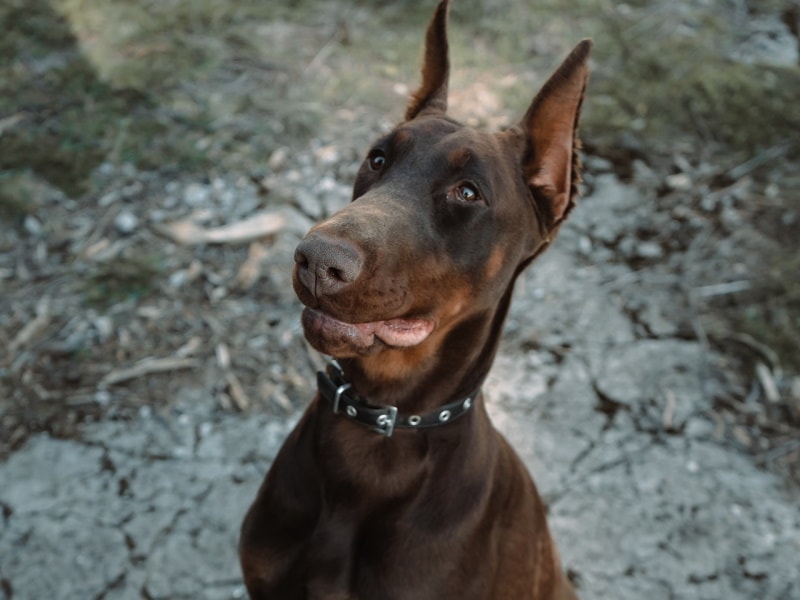
Are There Breeds That Don’t Drool?
No. All dogs drool, and it’s part of being a dog. But there are some significant differences between breeds. Dogs with prominent jaws, like bloodhounds, massifs, Newfoundlands, and Saint Bernards, tend to have large upper lips, which make it virtually impossible for these dogs to keep saliva in their mouths.
These breeds even have extra skin folds around their noses and mouths where the saliva collects. Greyhounds, corgis, and poodles don’t drool quite as much as most dogs. Dobermans are also on the list of low-drooling dogs, but keep in mind that even dogs who don’t drool that much are likely to let a few streams loose around mealtimes.
Development of the Breed
Doberman pinschers are a relatively new breed; they’ve only been around since the late 1890s. The breed was developed by Louis Dobermann, who was a German tax collector in need of a bit of protection. Although no one knows for sure what breeds Dobermann crossed to develop his new guard dogs, they appear to be a mix of black and tan terriers, German pinschers, Weimaraners, Rottweilers, and a few other breeds. Dobermann’s dogs were an immediate success, becoming famous for their intelligence, fearlessness, loyalty, and discipline. The American Kennel Club (AKC) acknowledged the breed in 1908.
Dobermans as Pets
While Dobermans can be wonderful pets, they’re not the right choice for every family, as they require good training or can become protective and aggressive at the wrong time. Dobermans can be loving, friendly, loyal, and playful companions with solid obedience training.
And keep in mind that while you may love your Dobbie, others may not be able to get beyond the breed’s reputation. Monthly brushing, occasional baths, regular nail clipping, and dental care are all required in the grooming department. Dobermans are incredibly active and need 1–2 hours of daily heart-pumping exercise. A walk is fine, but these powerful dogs prefer activities such as flyball and frisbee catching.
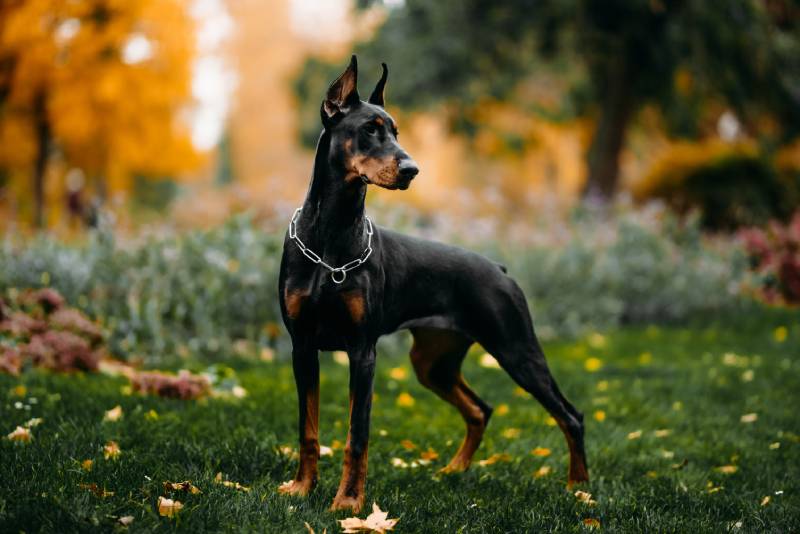
Are Dobermans Illegal?
That depends on where you live. Dobermans are often subject to local breed-specific bans in the United States. The breed is also subject to restrictions in Ireland and Germany. And many cities have regulations requiring Dobermans to be leashed and muzzled in public.
But the breed’s reputation can make life difficult for owners even in areas where these dogs aren’t subject to many restrictions. Landlords often refuse to allow Dobermans in their rental units, and many insurance companies won’t write homeowner’s policies for Doberman-owning households.
Dobermans as Working Dogs
Dobermans are working dogs! Since they’re active, athletic, smart and driven, they are happiest when they have a job to do. Dobermans have become one of the breeds of choice for law enforcement, the military, and search and rescue teams, thanks to their intelligence, discipline, and alertness.
They’re recognized around the world as disciplined, fearless guard dogs. And the breed also has qualities, such as loyalty and helpfulness, that make Dobermans popular service dogs. Dobies are in serious demand as guide and seizure-alert dogs, and they tend to bond deeply with and focus intensely on their favorite person!
Conclusion
Doberman pinschers are athletic, intelligent, loyal, and affectionate. They’re also incredibly obedient once adequately socialized. Originally bred to provide personal protection, Dobermans have several favorable characteristics that make them fantastic guide and therapy dogs. Because they’re so friendly and loyal, they typically make great family pets.
Dobermans aren’t naturally aggressive but can become overprotective of family members, which can be a problem if your pet isn’t properly socialized. They are generally easy to care for and aren’t frequent shedders or droolers.
Featured Image Credit: Jaydn Serrano, Shutterstock



